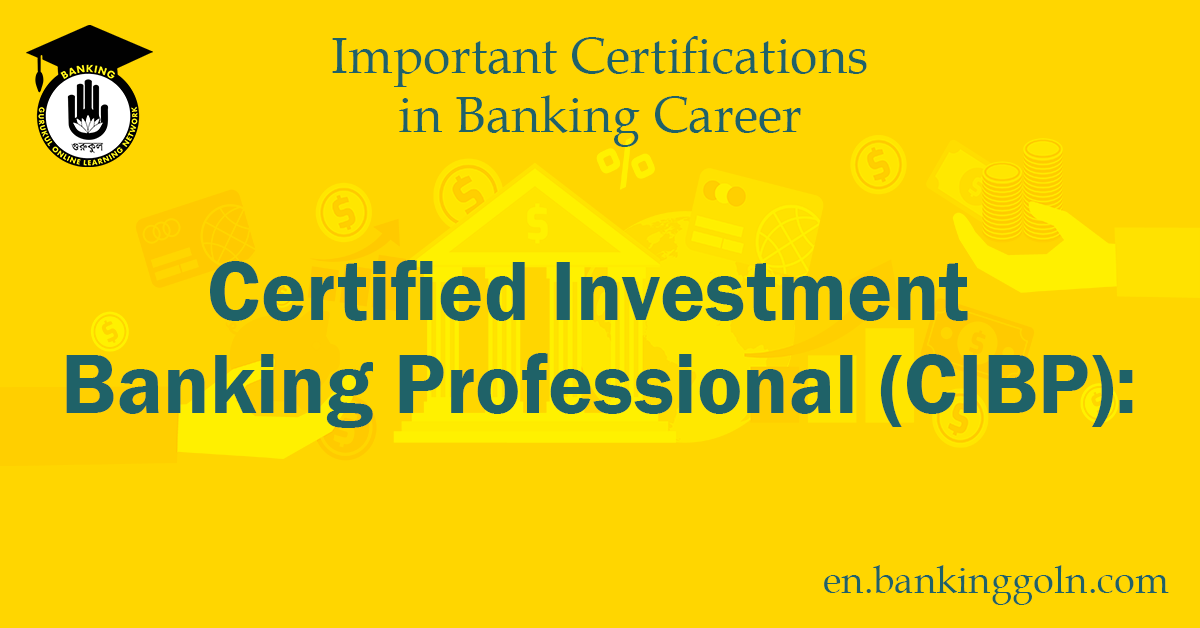Investment banking has always been a sought-after field, noted for its lucrative returns and dynamic opportunities. However, the professional demands of the industry are steep, calling for comprehensive knowledge, analytical aptitude, and a robust understanding of global financial markets. It’s where certifications such as the Certified Investment Banking Professional (CIBP) come into play. They establish a firm foundation of proficiency, demonstrating a candidate’s commitment and expertise in this complex field.
Certified Investment Banking Professional (CIBP)

The CIBP certification has gained traction amongst aspiring investment bankers for its comprehensive curriculum and its standing recognition across the industry. As an advanced certification, it offers an intensive look into the multifaceted world of investment banking, equipping candidates with the skills necessary to thrive in this high-stakes profession.

What is the Certified Investment Banking Professional (CIBP)?
The Certified Investment Banking Professional (CIBP) is a prestigious credential awarded by a globally recognized institute, embodying a professional’s comprehensive understanding of investment banking operations. This certification is designed to cover the core competencies required by an investment banking professional, from mergers and acquisitions to securities trading, capital markets, and financial modeling.
The CIBP signifies advanced knowledge and understanding of complex investment banking principles, such as valuations, financial structuring, leveraged buyouts, and deal structuring. It also ensures a candidate’s proficiency in investment banking tools, regulations, ethics, and market operations. This breadth of knowledge makes CIBP holders ideally suited for high-level roles in investment banking, enhancing their career prospects and earning potential.

Importance of CIBP Certification
While a degree in finance or a related field might provide the theoretical knowledge necessary for a career in investment banking, it does not necessarily guarantee the skills needed to succeed in real-world scenarios. The CIBP certification fills this gap, offering practical knowledge and application-based learning to tackle the challenges that investment bankers face daily.
Apart from the skills and knowledge, the CIBP certification also lends credibility to a professional’s profile. With competition heating up in the financial industry, having a certification that testifies to your capabilities can set you apart. It is a clear indication of dedication, competence, and a commitment to continual learning, values that employers highly appreciate.

Key Components of the CIBP Certification
Comprehensive Curriculum
The curriculum for the CIBP is designed to provide an exhaustive understanding of investment banking. It encompasses topics like Equity and Debt Capital Markets, Mergers & Acquisitions, Financial Modeling and Valuation, Trading, and Securities Issuance, among others. This diverse curriculum ensures a holistic view of investment banking operations.
Rigorous Examination
The CIBP certification requires candidates to pass a rigorous examination that tests their understanding and application of investment banking concepts. The exam comprises multiple-choice questions and case studies, designed to evaluate a candidate’s practical understanding of complex investment banking principles.
Real-World Application
The CIBP certification goes beyond theoretical knowledge, focusing on the practical applications of investment banking concepts. Candidates learn to apply theories and tools in realistic scenarios, developing the hands-on skills that employers seek.
Global Recognition
The CIBP certification is recognized globally, making it an ideal choice for professionals looking to work in international markets. This global acceptance is a testament to the high standards maintained by the certification body.

Preparing for the CIBP Certification
Given the advanced nature of the certification, thorough preparation is necessary to pass the CIBP examination. A combination of self-study, training courses, and practical experience is typically the most effective approach.
Self-Study
Many candidates choose to self-study for the certification, leveraging a wide range of resources available online. The certification body typically provides a comprehensive study guide covering all exam topics, as well as practice exams to help candidates familiarize themselves with the test format.
Training Courses
Another effective way to prepare for the CIBP certification is through training courses. Several institutions offer tailored courses to help candidates master the complex concepts of investment banking. These courses often provide in-depth content, practice exams, and the opportunity to learn from experienced professionals.
Practical Experience
Although not a requirement for the CIBP certification, having practical experience in investment banking can greatly enhance a candidate’s understanding of the concepts. Real-world exposure can complement theoretical learning, providing context and helping to solidify knowledge.

The Career Impact of CIBP Certification
Investment banking professionals with the CIBP certification often see significant career benefits. The certification serves as a badge of excellence, reflecting an advanced understanding of investment banking that can enhance job prospects, increase earning potential, and open the door to new opportunities.
Enhanced Job Prospects
Given the comprehensive knowledge and skills that the CIBP certification represents, certified professionals often find themselves in high demand. They are well-positioned for roles in investment banking, private equity, venture capital, and financial consulting.
Increased Earning Potential
The CIBP certification can lead to higher salaries, as employers recognize the value of certified professionals. The rigorous training and in-depth knowledge that the certification signifies can command a premium in the job market.
Growth Opportunities
With the advanced knowledge and skills gained through the CIBP certification, professionals can explore new growth opportunities. The certification paves the way for leadership roles in investment banking and can serve as a stepping stone to other prestigious certifications in the field.

Investment banking is a complex and dynamic field that requires a robust knowledge base, a knack for analysis, and an understanding of global financial markets. The Certified Investment Banking Professional (CIBP) certification provides this foundation, offering a comprehensive curriculum and rigorous assessment that prepare professionals for the challenges of the industry.
Whether you’re an aspiring investment banker or an established professional looking to upskill, the CIBP certification can be a strategic move. With its global recognition, comprehensive curriculum, and focus on real-world application, the CIBP certification paves the way for a prosperous career in investment banking.
See more:
- Investment banking Wiki
- GOLN Technology in Banking Book: Table of Contents
- GOLN Risk Management In Banking Book: Table of Contents
- GOLN Mobile Banking Book : Table of Contents
- GOLN Cyber Security in Banking Book : Table of Contents
- GOLN Banking & Financial Services Compliance Management Book : Table of Contents
- TOC of Career in Banking
